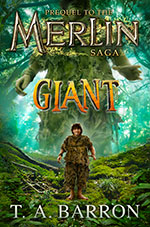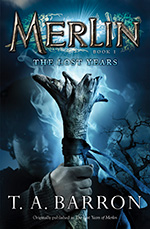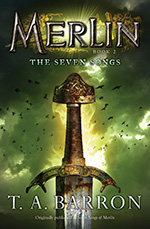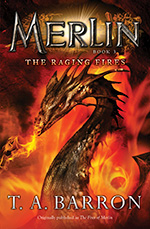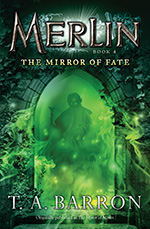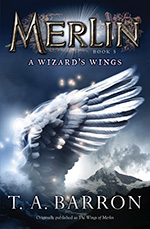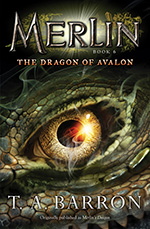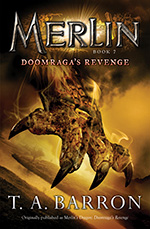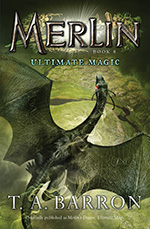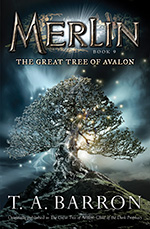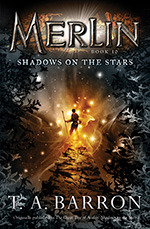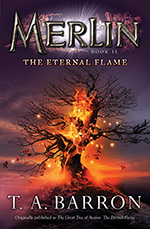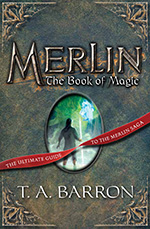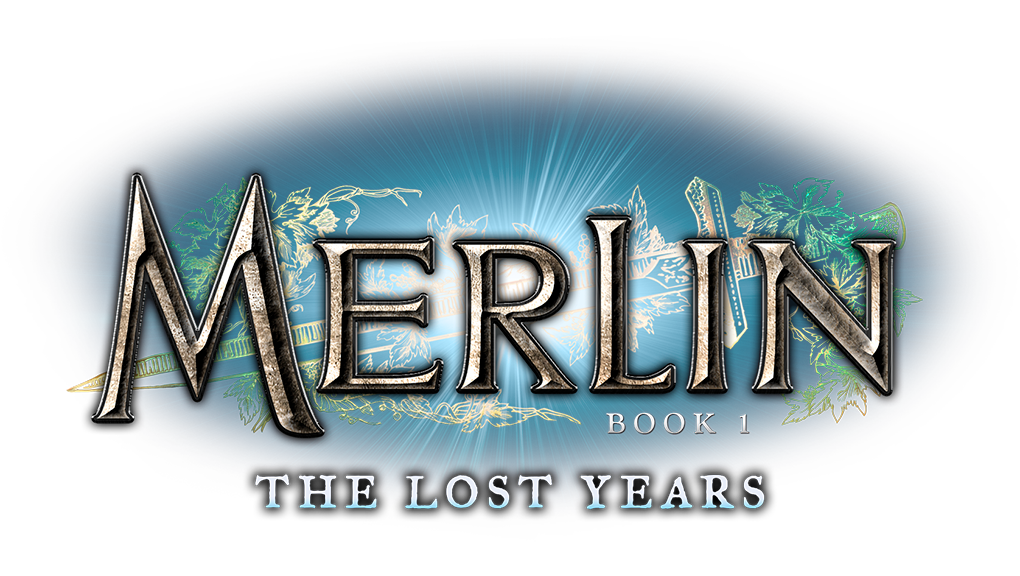
THE LOST YEARS EXCERPT
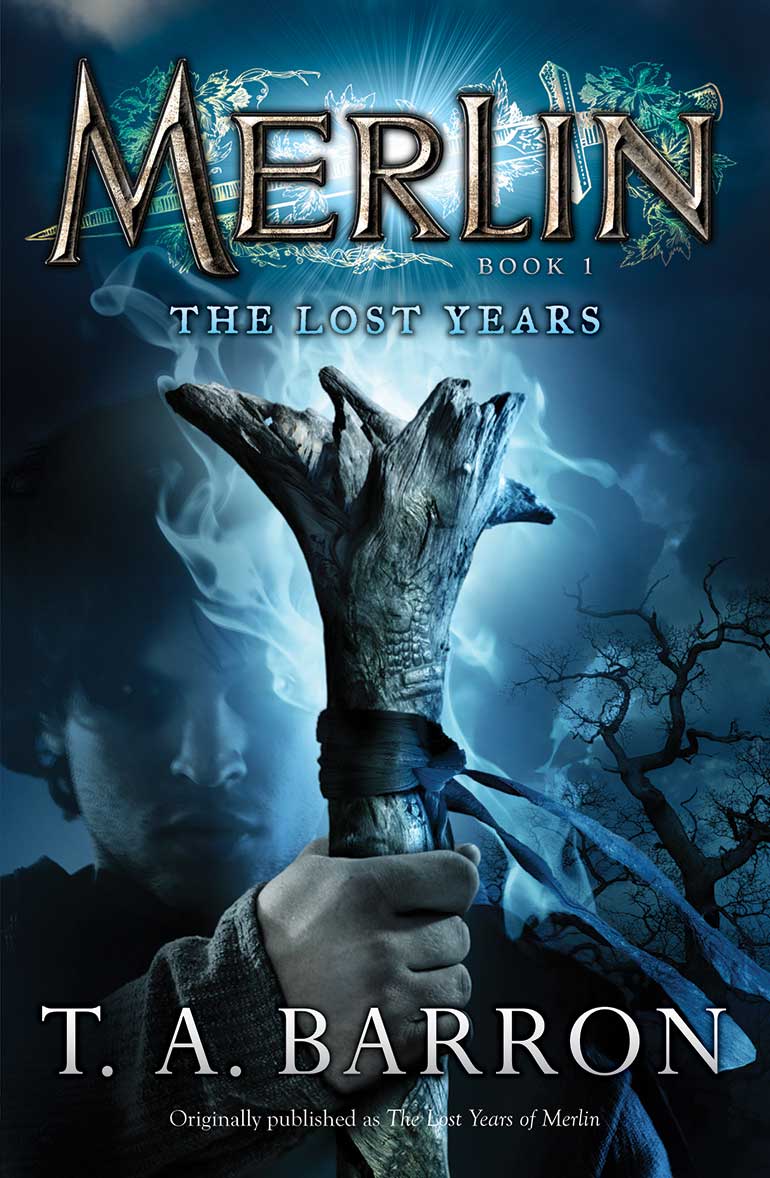
Prologue
If I close my eyes, and breathe to the rolling rhythm of the sea, I can still remember that long ago day. Harsh, cold, and lifeless it was, as empty of promise as my lungs were empty of air.
Since that day, I have seen many others, more than I have the strength left to count. Yet that day glows as bright as the Galator itself, as bright as the day I found my own name, or the day I first cradled a baby who bore the name of Arthur. Perhaps I remember it so clearly because the pain, like a scar on my soul, will not disappear. Or because it marked the ending of so much. Or, perhaps, because it marked a beginning as well as an ending: the beginning of my lost years.
A dark wave rose on the rolling sea, and from it lifted a hand.
As the wave surged higher, reaching toward sky as smoky gray as itself, the hand reached higher as well. A bracelet of foam swirled around the wrist, while desperate fingers groped for something they could not find. It was the hand of someone small. It was the hand of someone weak, too weak to fight any longer.
It was the hand of a boy.
With a deep sucking sound, the wave began to crest, tilting steadily toward the shore. For an instant it paused, hovering between ocean and land, between the brooding Atlantic and the perilous, rock-bound coast of Wales, known in those days as Gwynned. Then the sucking swelled into a crashing roar as the wave toppled over, hurling the boy’s limp body onto the black rocks.
His head smacked against a stone, so violently that his skull would surely have split open were it not for the thick mat of hair that covered it. He lay completely still, except when the whoosh of air from the next wave tousled his locks, black beneath the stains of blood.
A shabby seagull, seeing his motionless form, hopped over the jumble of rocks for a closer look. Bending its beak toward the boy’s face, it tried to pull a strand of sea kelp that was wrapped around his ear. The bird tugged and twisted, squawking angrily. At last the kelp broke free. Triumphantly, the bird jumped down to one of the boy’s bare arms. Beneath the shreds of a brown tunic still clinging to him, he seemed small, even for a boy of seven years. Yet something about his face—the shape of his brow, perhaps, or the lines around his eyes—seemed far older.
At that instant, he coughed, vomited seawater, and coughed again. With a screech, the gull dropped the kelp and fluttered off to a stony perch.
The boy remained motionless for a moment. All he could taste was sand, slime, and vomit. All he could feel was the painful throbbing of his head, and the rocks jabbing into his shoulders. Then came another cough, another gush of seawater. A halting, labored breath. Then a second breath, and a third. Slowly, his slender hand clenched into a fist.
Waves surged and subsided, surged and subsided. For a long while, the small candle flame of life in him wavered at the edge of darkness. Beneath the throbbing, his mind seemed strangely empty. Almost as if he had lost a piece of his very self. Or as if a kind of wall had been erected, cutting him from a portion of himself, leaving nothing but a lingering sense of fear.
His breathing slowed. His fist relaxed. He gasped, as if to cough again, but instead fell still.
Cautiously, the seagull edged closer.
Then, from whatever quarter, a thin thread of energy began to move through his body. Something inside him was not yet ready to die. He stirred again, breathed again.
The gull froze.
He opened his eyes. Shivering with cold, he rolled to his side. Feeling the rough sand in his mouth, he tried to spit, but succeeded only in making himself gag from the rancid taste of kelp and brine.
With effort, he raised an arm and wiped his mouth with the tatters of his tunic. Then he winced, feeling the raw lump on the back of his head. Willing himself to sit up, he braced his elbow against a rock and pushed himself upright.
He sat there, listening to the grinding and splashing sea. Beyond the ceaseless pulsing of the waves, beyond the pounding inside his head, he thought for an instant that he could hear something else—a voice, perhaps. A voice from some other time, some other place, though he could not remember where.
With a sudden jolt, he realized that he could not remember anything. Where he had come from. His mother. His father. His name. His own name. Hard as he tried, he could not remember. His own name.
“Who am I?”
Hearing his cry, the gull squawked and took flight.
Catching sight of his reflection in a pool of water, he paused to look. A strange face, belonging to a boy he did not know, peered back at him. His eyes, like his hair, were as black as coal, with scattered flecks of gold. His ears, which were almost triangular and pointed at the top, seemed oddly large for the rest of his face. Likewise, his brow rose high above his eyes. Yet his nose looked narrow and slight, more a beak than a nose. Altogether, his face did not seem to belong to itself. He mustered his strength and rose to his feet. Head swirling, he braced himself against a pinnacle of rock until the dizziness calmed.
His eyes roamed over the desolate coastline. Rocks upon rocks lay scattered everywhere, making a harsh black barrier to the sea. The rocks parted in only one place — and then only grudgingly — around the roots of an ancient oak tree. Its gray bark peeling, the old oak faced the ocean with the stance of centuries. There was a deep hollow in its trunk, gouged out by fire ages ago. Age warped its every branch, twisting some into knots. Yet it continued to stand, roots anchored, immutable against storm and sea. Behind the oak stood a dark grove of younger trees, and behind them, high cliffs loomed even darker.
Desperately, the boy searched the landscape for anything he might recognize, anything that might coax his memory to return. He recognized nothing.
He turned, despite the stinging salt spray, to the open sea. Waves rolled and toppled, one after another after another. Nothing but endless gray billows as far as he could see. He listened again for the mysterious voice, but heard only the distant call of a kittiwake perched on the cliffs.
Had he come from somewhere out there, beyond the sea?
Vigorously, he rubbed his bare arms to stop the shivers. Spying a loose clump of sea kelp on a rock, he picked it up. Once, he knew, this formless mass of green had danced with its own graceful rhythm, before being uprooted and cast adrift. Now it hung limp in his hand. He wondered why he himself had been uprooted, and from where. A low, moaning sound caught his ear. That voice again! It came from the rocks beyond the old oak tree.
He lurched forward in the direction of the voice. For the first time he noticed a dull ache between his shoulder blades. He could only assume that his back, like his head, had slammed against the rocks. Yet the ache felt somehow deeper, as if something beneath his shoulders had been torn away long ago.
After several halting steps he made it to the ancient tree. He leaned against its massive trunk, his heart pounding. Again he heard the mysterious moaning. Again he set off.
Often his bare feet would slip on the wet rocks, pitching him sideways. Stumbling along, his torn brown tunic flapping about his legs, he resembled an ungainly water bird, picking his way across the shoreline. Yet all the time he knew what he really was: a lone boy, with no name and no home.
Then he saw her. Crumpled among the stones lay the body of a woman, her face beside a surging tidal pool. Her long, unbraided hair, the color of a yellow summer moon, spread about her head like rays of light. She had strong cheekbones and a complexion that would be described as creamy were it not tinged with blue. Her long blue robe, torn in places, was splotched with sand and sea kelp. Yet the quality of the wool, as well as the jeweled pendant on a leather cord around her neck, revealed her to have been once a woman of wealth and stature.
He rushed forward. The woman moaned again, a moan of inextinguishable pain. He could almost feel her agony, even as he could feel his own hopes rising. Do I know her? He asked himself as he bent over her twisted body. Then, from a place of deeper longing, Does she know me?
With a single finger he touched her cheek, as cold as the cold sea. He watched her take several short, labored breaths. He listened to her wretched moaning. And, with a sigh, he admitted to himself that she was, for him, a complete stranger.
Still, as he studied her, he could not suppress the hope that she might have arrived on this shore together with him. If she had not come on the same wave, then at least she might have come from the same place. Perhaps, if she lived, she might be able to fill the empty cup of his memory. Perhaps she knew his very name! Or the names of his mother and father. Or perhaps…she might actually be his mother.
A frigid wave slapped against his legs. His shivers returned, even as his hopes faded. She might not live, and even if she did, she probably would not know him. And she certainly could not be his mother. That was too much to hope for. Besides, she could not have looked less like him. She looked truly beautiful, even at the edge of death, as beautiful as an angel. And he had seen his own reflection. He knew what he looked like. Less like an angel than a bedraggled, half-grown demon.
A snarl erupted from behind his back.
The boy whirled around. His stomach clenched. There, in the shadows of the dark grove, stood an enormous wild boar.
A low, vicious growl vibrating in its throat, the boar stepped out of the trees. Bristling brown fur covered its entire body except for the eyes and a gray scar snaking down its left foreleg. Its tusks, sharp as daggers, were blackened with the blood of a previous kill. More frightening, though, were its red eyes, which glowed like hot coals.
The boar moved smoothly, almost lightly, despite its hulking form. The boy stepped backward. This beast outweighed him several times over. One kick of its leg would send him sprawling. One stab of its tusk would rip his flesh to shreds. Abruptly the boar stopped and hunched its muscular shoulders, preparing to charge.
Glancing behind, the boy could see only the onrushing waves of the ocean. No escape that way. He grabbed a crooked shard of driftwood to use as a weapon, though he knew it would not even begin to pierce the boar’s hide. Even so, he tried to plant his feet on the slippery rocks, bracing for the attack.
Then he remembered. The hollow in the old oak! Although the tree stood about halfway between him and the boar, he might be able to get there first.
He started to dash for the tree, then suddenly caught himself. The woman. He could not just leave her there. Yet his own chance for safety depended on speed. Grimacing, he tossed aside the driftwood and grabbed her limp arms.
Straining his trembling legs, he tried to pull her free from the rocks. Whether from all the water she had swallowed or from the weight of death upon her, she felt as heavy as the rocks themselves. Finally, under the flaring eyes of the boar, she budged.
The boy began dragging her toward the tree. Sharp stones cut into his feet. Heart racing, head throbbing, he pulled with all his power.
The boar snarled again, this time more like a raspy laugh. The whole body of the beast tensed, nostrils flaring and tusks gleaming. Then it charged.
Though the boy was only a few feet from the tree, something kept him from running. He snatched a squarish stone from the ground and hurled it at the boar’s head. Only an instant before reaching them, the boar changed direction. The stone whizzed past and clattered on the ground.
Amazed that he could have possibly daunted the beast, the boy quickly bent to retrieve another stone. Then, sensing some movement over his shoulder, he spun around. Out of the bushes behind the ancient oak bounded an immense stag. Bronze in hue, except for the white boots on each leg that shone like purest quartz, the stag lowered its great rack of antlers. With the seven points on each side aimed like so many spears, the stag leaped at the boar. But the beast swerved aside just in time to dodge the thrust.
As the boar careened and snarled ferociously, the stag leaped once again. Seizing the moment, the boy dragged the limp woman into the hollow of the tree. By folding her legs tight against her chest, he pushed her entirely into the opening. The wood, still charred from some ancient fire, curled around her like a great black shell. He wedged himself into the small space beside her, as the boar and the stag circled each other, pawing the ground and snorting wrathfully.
Eyes aflame, the boar feigned a charge at the stag, then bolted straight at the tree. Hunched in the hollow, the boy drew back as far as he could. Yet his face remained so close to the gnarled bark of the opening that he still could feel the boar’s hot breath as its tusks slashed wildly at the trunk. One of the tusks grazed the boy’s face, gashing him just below the eye.
At that moment the stag plowed into the flank of the boar. The bulky beast flew into the air and landed on its side near the bushes. Blood oozing from a punctured thigh, the boar scrambled to its feet.
The stag lowered its head, poised to leap again. Hesitating for a split second, the boar snarled one final time before retreating into the trees.
With majestic slowness, the stag turned toward the boy. For a brief moment, their eyes met. Somehow the boy knew that he would remember nothing from that day so clearly as the bottomless brown pools of the stag’s unblinking eyes, eyes as deep and mysterious as the ocean itself.
Then, as swiftly as it had appeared, the stag leaped over the twisted roots of the oak and vanished from sight.

